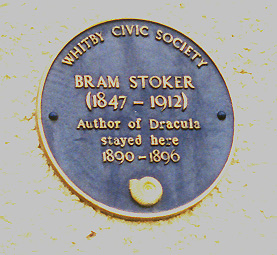It was apparently VERY important that Bram Stoker stayer there once.
In a modern day context, Dracula is one of the most well icons in the current culture, numerous works of fiction have either included him or referenced him at some point. His presence is practically impossible to avoid when even mentioning the word "Vampire" and has become as synonymous with the term as King Arthur with "Knights". Of course, many people also know by now that the real-life Dracula, Vlad the Impaler, was not an actual vampire, but the association is ironclad at this point. I myself knew about "Dracula" long before I ever heard the name "Vlad Tepes", and I have no doubt that for all reading this, it was the same way with you.
"Dracula" was written by Bram Stoker and published in 1897, on the cusp of the 20th century. It was the founder of many Horror tropes still used to this day, and can actually be considered one of the most famous examples of "Zombie Horror" in literature (Albeit intelligent zombies, but the point still stands). It tells the tale of an undead creature in the guise of a man named Count Dracula who seeks to spread his "disease" to all the people of England, and how his efforts are ultimately thwarted by a small group of extraordinary gentlemen (and Mina, she's important too). This story of ordinary people trying their best to thwart a large supernatural creature created a new sub-genre of the trope of "Knight versus Dragon", namely that man who accomplishes with wits and integrity that which required his predecessors divine or magical intervention.
Of course, what exactly does Dracula represent as a symbol (that is the point of this post, right)? As Tanya Pikula points out in her paper "Bram Stoker's Dracula and Late-Victorian Advertising Tactics", Dracula is a social predator, a literal "consumer" of women, and the only women in the novel who get turned by him are those girls who deviate from the Victorian Ideals of the time: Soft-spoken, motherly and submissive to their spouses. To this end, Dracula is "the enabler", the one who leads those astray further off the path. He could also be seen as a literal avatar of the changing times, with promiscuity on the rise and crime emerging from the underground. He was the rockstar of his era, the "Bad Boy" that we see so much in television, and an omen of times to come.
Image Credit: "Bram Stoker Commemorative Plaque" obtained via Wikimedia Commons


I want to hear more about this. All I've ever known is horrible Halloween costumes and cartoon rip-offs of the story. Like Dr. Jekyll and Mr. Hyde, I've always hoped that there would be more to the story of Dracula. I like the idea of him being a social warning.
ReplyDelete